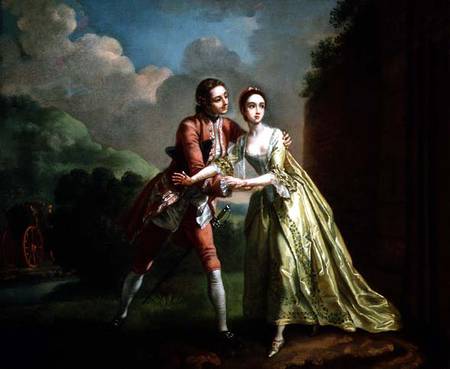Monday
The Literary Hub website has alerted me to a work about my scholarly field of expertise that I’ve got to get my hands on. Apparently Ritchie Robertson’s The Enlightenment: The Pursuit of Happiness, 1680-1790 contends that novels played a critical role in teaching empathy to an exploding middle class readership.
In an excerpt from the book, we see Ritchie focusing on epistolary novels, particularly Samuel Richardson’s Clarissa. Ritchie writes,
New scope for empathy was offered by the epistolary novel. By presenting a character’s experience through letters, the novelist brings us close to that experience as it happens. We follow the character’s thoughts and feelings in real time, as uncertain as they are about what will happen next. When a novel offers letters from several different people, we have something further: we understand characters’ experience from the inside while appreciating the diversity of characters. We are invited to feel the humanity even of those we dislike, and we are encouraged to feel intensely the sufferings of persecuted victims. Stories told in letters involve their readers far more intimately than stories recounted from the distant perspective of an impersonal narrator.
Given that the 18th century became known for proclaiming the rights of man (Thomas Paine) and the rights of women (Mary Wollstonecraft), one can see why teaching empathy would be a big deal. Ritchie writes that reading novels
helped people in the 18th century to put themselves in other people’s shoes, and sensitized them to cruelty in everyday life, savage punishments and abuses of human rights: In reading, they empathized across traditional social boundaries between nobles and commoners, masters and servants, men and women, perhaps even adults and children. As a consequence, they came to see others—people they did not know personally—as like them, as having the same kind of inner emotions.
Clarissa is about a rake who kidnaps the heroine under the pretext of rescuing her and who, when she continues to resist his advances, sedates her with opium and rapes her. Over a million words long, Richardson’s novel plunges us deeply into the psychology of numerous characters, especially Clarissa and Lovelace:
Lovelace stylizes himself as a Restoration rake and casts Clarissa as a proud beauty who must be conquered. His stale language of gallantry (“on the wings of love, I fly to my charmer”) contrasts with Clarissa’s directness and honesty, her “plain dealing,” which he fails to understand. Immediately after the rape, Clarissa’s distress emerges from a series of barely coherent draft letters, while Lovelace appears callously impenitent; but even as a victim Clarissa shows herself the stronger character. Her inner strength enables her to prepare for death, face it calmly, and write letters of forgiveness to all her family and even to Lovelace, while he tries to evade the fact of death by his fantasy of embalming her body and preserving her heart in a golden casket.
Ritchie particularly appreciates how French philosophe Denise Diderot sees Richardson “disclosing the evil concealed behind flattering self-deceptions in the dark recesses of the self.” Diderot writes of Richardson,
It is he who carries the torch into the depths of the cavern; it is he who learns to perceive the subtle and disreputable motives hidden and disguised beneath other motives which are respectable and which are eager to display themselves first. He breathes upon the sublime phantom that presents itself at the entrance to the cavern; and the hideous Moor behind the mask is revealed.
I’ll have to see who else Ritchie treats in the book and hope he doesn’t overlook Daniel Defoe, who also got readers to enter the minds of people very much unlike themselves. In the first person narration of Moll Flanders, readers find themselves identifying with a thief, prostitute, and bigamist, in that of Roxana with a courtesan.
Other epistolary novels of the time include Fanny Burney’s Evelina and Tobias Smollett’s Humphrey Clinker. Smollett’s novel especially gets at the discord experienced by traditionalists at the influx of foreign trade and the mixing of classes. Ritchie is right that epistolary novels were particularly effective at capturing the effects.
A confusing century required a new (or novel) genre to do it justice. Richardson and others stepped forward.
